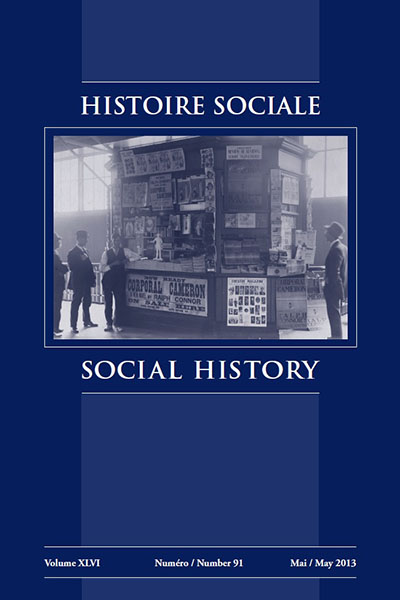La Fédération nationale Saint-Jean Baptiste, le droit de vote et l’avancement du statut civique et politique des femmes au Québec
DOI :
https://doi.org/10.1353/his.2013.0011Résumé
Pour la première génération de dirigeantes de la Fédération nationale Saint-Jean Baptiste (FNSJB), la question du droit de vote des femmes apparaît comme un problème complexe. Fédérant le réseau associatif franco-catholique québécois durant les trois premières décennies du XX e siècle, la Fédération relaye la victoire de nombreux mouvements suffragistes à l’échelle internationale et participe à l’obtention du droit de vote au fédéral. Toutefois, ses tentatives pour promouvoir le suffrage féminin au provincial se trouveront contraries longtemps par des élites cléricales catholiques qui y sont très hostiles. Ce sont les militantes de la génération suivante qui auront finalement gain de cause en 1940. Envisageant l’ensemble de l’action de la FNSJB dans le domaine philanthropique, le présent texte analyse les interventions de la Fédération sur la question du droit de vote dans le contexte du féminisme maternaliste, c’est-à-dire comme un mouvement qui vise à l’élargissement de la sphère publique des femmes à partir d’une reconstruction des valeurs et qualités alors associées au genre féminin. Longtemps déconsidérée par l’historiographie féministe, car témoignant de la faiblesse constitutive de sa revendication, cette position s’inscrit toutefois dans la continuité des mouvements suffragistes d’alors, dont la Fédération portera ainsi le discours au Québec. Ce texte montre que loin d’être un handicap, la posture maternaliste adoptée par la Fédération lui permettra de revendiquer avec un certain succès le droit de vote pour les femmes aux élections fédérales, provincials et municipales, ce qui la classe ainsi dans la première vague féministe.
For the first generation of leaders of the Fédération nationale Saint-Jean Baptiste (FNSJB), the issue of women’s right to vote appeared to be a complex problem. The Fédération, which united Quebec's Franco-Catholic associative network during the first three decades of the 20th century, supported the victories of numerous suffragist movement on the international scene and played a role in the granting of the right to vote at the federal level. However, its attempts to promote women’s suffrage at the provincial level were for some time frustrated by Catholic clerical elites, who were quite hostile to the concept. The next generation of activists finally overcame their resistance in 1940. This paper considers the organization’s philanthropic efforts as a whole, then analyzes its interventions on the issue of suffrage within the context of maternalist feminism, that is to say, as a movement seeking to expand women’s public sphere through a reconstruction of the values and qualities then associated with femininity. Long discredited by feminist historiography due to the so-called weakness of its demands, this position did, however, fall within the continuum of suffragist movements of the time, whose discourse the Fédération championed in Quebec. This text demonstrates that, far from being a handicap, the maternalist position adopted by the Fédération allowed the organization to lobby for women’s right to vote at the three levels of government with a certain degree of success and was therefore part of first wave feminism.


